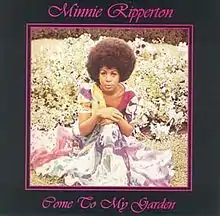Come to My Garden
Come to My Garden is the debut studio album by American singer-songwriter Minnie Riperton which was produced, arranged and orchestrated by Charles Stepney and released in 1970 under GRT Records. It was re-released in 1974 on the Janus label, in the same time frame as Riperton's album Perfect Angel and her hit "Lovin' You."[4]
| Come to My Garden | ||||
|---|---|---|---|---|
 | ||||
| Studio album by | ||||
| Released | November 1970 | |||
| Recorded | November 24–26, 1969 Ter Mar Studios (Chicago, Illinois) | |||
| Genre | ||||
| Label | GRT | |||
| Producer | Charles Stepney | |||
| Minnie Riperton chronology | ||||
| ||||
| Review scores | |
|---|---|
| Source | Rating |
| Allmusic | |
| Billboard | (favourable)[2] |
| Cashbox | (favourable)[3] |
The album was first released on CD in 1990, and has since been made available in digital form. None of the CD editions have material transferred directly from the original master tapes. All CD editions were mastered in UK, USA and other countries using LP records and different noise reduction methods. It is quite possible that original tapes that belonged to GRT were lost forever.
The album peaked at number 160 on the U.S. Billboard 200 chart in 1974.[5] Some versions of the CD release do not include the last track, "Whenever, Wherever." Riperton said she wanted a sound like the great Dionne Warwick / Burt Bacharach collaborations for the album.
Background
Minnie Riperton was presented as a solo artist by Ramsey Lewis on Saturday, December 26, 1970, at Chicago's famed London House. She performed several numbers from the album accompanied by Charles Stepney, the album's producer. Although commercially unsuccessful, Come to My Garden is considered a masterpiece by critics. "Les Fleur"[lower-alpha 1] is probably the album's best known song, and "Expecting" remains a favourite among fans.
The heavy rock aspect of Riperton's band Rotary Connection is absent here, replaced by lush orchestrations and a jazzy soft-pop feel that complements Riperton's multi-octave voice. The songs, mostly by Stepney and Riperton's husband Richard Rudolph, are mostly minor-key ballads, with alternately sorrowful and poetic lyrics. The singer-songwriter-y results recall early albums by Roberta Flack as well as the contemporary work by Riperton's future employer/mentor Stevie Wonder.
Track listing
- Side 1
- "Les Fleur"[lower-alpha 1] (Charles Stepney, Richard Rudolph) – 3:18
- "Completeness" (Stepney, Rose Johnson) – 3:32
- "Come to My Garden" (Rudolph) – 3:19
- "Memory Band" (Stepney) – 4:05
- "Rainy Day in Centerville" (Stepney, Rudolph) – 5:22
- Side 2
- "Close Your Eyes and Remember" (Stepney, Rudolph) – 3:38
- "Oh, By the Way" (Stepney, Rudolph) – 2:58
- "Expecting" (Stepney, Jon Stocklin) – 3:51
- "Only When I'm Dreaming" (Stepney, Sidney Barnes) – 3:24
- "Whenever, Wherever" (Stepney, Johnson) – 3:34[7]
Personnel
- Elsa Harris, Kitty Hayward, Minnie Riperton – Backing vocals
- Maurice White – Drums
- Phil Upchurch – Guitar
- Ramsey Lewis – Piano
- Charles Stepney – Arranger and conductor
- Minnie Riperton – Vocals[8]
Legacy
The album has been featured in various samples and covers.
- "Rainy Day in Centerville" was sampled in "Where Y'all At" by Nas from the album Hip Hop Is Dead
- "Only When I'm Dreaming" was sampled in "Hellucination" by Smif-n-Wessun from the album Dah Shinin'
- "Les Fleur"[lower-alpha 1] was covered by British band 4hero on their 2001 album Creating Patterns.[9]
- "Les Fleur" was featured in Paul Thomas Anderson's 2014 film adaptation of Inherent Vice, and during the ending of the 2019 horror film Us.
Notes
- For unknown reasons the original record label spelled the song as "Les Fleur,"[6] although the French plural of "La Fleur" (flower) would normally be spelled "Les Fleurs." Many reissues and compilations use the latter spelling.
References
- Allmusic review
- Special Merit Picks. 82. Billboard Magazine. December 6, 1970. p. 65.
- Cashbox Album Reviews. 32. Billboard Magazine. November 28, 1970. p. 28.
- https://www.discogs.com/Minnie-Riperton-Come-To-My-Garden/release/3561181
- "Minnie Riperton – Chart history". Billboard. Archived from the original on August 21, 2017. Retrieved August 21, 2017.
- "Minnie Riperton – Come To My Garden". www.discogs.com. Retrieved August 16, 2017.
- Vinyl edition of Come to My Garden on discogs.com
- CD edition of Come to My Garden on discogs.com
- Chick, Stevie (June 29, 2016). "Minnie Riperton – 10 of the best". The Guardian.